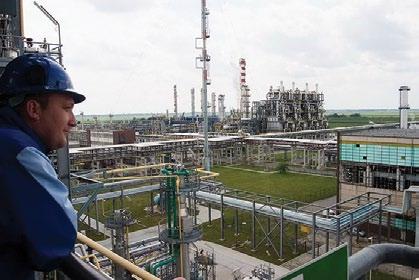
5 minute read
It’s full steam ahead for mol MOL group


iT’s full sTeAm AHeAd for mol

Global oil and gas company, MOL group is proceeding full steam ahead in investing in several large-scale projects so to strengthen their competitive advantages and stand out from competitors by bringing about changes in their industry with environmentally friendly solutions.



Headquartered in Budapest, Hungary, MOL has an international and dynamic workforce of 25,000 people in more than 30 countries and over 100 years of industry experience. MOL’s research and production activities are supported by over 80 years of experience in the hydrocarbon industry. The MOL Group operates four refineries and two petrochemical plants in integrated supply chain management in Hungary, Slovakia and Croatia, and has a retail network of more than 2,000 filling stations in 10 countries in Central and Southeast Europe.
Polyol factory – mol’s largest organic investment

In line with MOL’s 2030 business strategy, the company is aiming to extend their petrochemical value chain towards semi-finished goods and special chemical products in order to become the leading chemical player in the Central and Eastern European region. Due to its extensive range of applications, polyether polyol is the main focus of MOL’s petrochemical development. Polyol is the basic material for polyurethane products, which are used in many different segments including the construction industry, the furniture industry, car manufacturing and the textile industry.
In 2018 the largest organic investment in the history of the MOL group began when MOL and the German thyssenkrupp signed a contract to build a new polyol plant. The 1.2 billion euro investment will be the only integrated polyol manufacturing facility in Centre and Eastern Europe. The annual capacity of the new plant will reach 200 kilo tonnes and this will provide jobs for at least 200 people on the long term in Tiszaújváros. The new facility is expected to start operation in the second half of 2021.
New rubber bitumen plant
In the Zala region MOL has been producing hydrocarbons for over 80 years and has been refining for more than 65 years. In 2012 a 5,000 tonne capacity rubber bitumen plant was opened in the Zala Refinery, and this year the construction of an additional plant began to meet the increased demand. The new rubber bitumen factory will enhance the efficiency in the Refinery and will secure jobs for at least 100 employees. The 3 billion forint (9 million euro) investment will start its operation in 2020 with an annual capacity of 20,000 tonnes.
Rubber bitumen is produced by environmentally friendly patented technology that was developed by MOL and Pannon University.





This innovation enables road construction companies to build more durable asphalt roads with higher load capacity and less maintenance costs. Rubber bitumen roads are extremely durable; none of the roads built with rubber bitumen have any potholes on them yet, even though the oldest experimental roadway being built in Hungary is now 15 years old. MOL primarily targets the domestic market for road construction. The new plant will use 3,000 tonnes of crumb rubber annually to produce rubber bitumen and this contributes to the recycling of about half a million used tyres. This amount is 8-10 per cent of the annual domestic tyre waste in Hungary. The annual production of 20,000 tonnes of rubber bitumen will enable the construction of a 200 km 2x1 lane road, or the renovation of the upper layer of a 600 km 2x1 lane road.
“In our 2030 strategy we emphasise the production of environmentally friendly, small volume, innovative goods. We are ready to bring about change: we are the only company in the CEE region that has a proprietary patent to the rubber bitumen technology. According to the calculations the cost of the road made with rubber bitumen can be lowered by 30 per cent during its 30-year lifecycle and this cost saving will stimulate the widespread use of rubber bitumen in the national economy. On top of that, we reduce our carbon footprint and create quieter and pothole-free roads in Hungary,” says Zsolt Hernádi, Chairman and CEO of the MOL Group.

New acquisition of a recycled plastic compounder, the Aurora group
Whilst focusing on core activities MOL has also turned their focus to recycled plastics. In April this year, MOL signed a sales-purchase agreement to acquire the Aurora group, a recycled plastic compounder with production plants located in nearby automotive manufacturing and plastics conversion clusters in Baden-Wurttemberg, Germany. Aurora mainly supplies the automotive industry with a uniquely collected compound made of post-industrial plastic waste. The company’s portfolio primarily consists of recycled technical plastics and polypropylene based compounds.
Thanks to this investment, MOL will be able to offer a wide range of high-quality polyamide, polypropylene and other recycled compounds, complementing its existing product portfolio that is currently made of nature polypropylene and polyethylene. Using Aurora’s know how and their unique closed loop collection system MOL will enable their partners to efficiently increase the ratio of recycled plastic parts in their products.
mol Campus – the relocation of Budapest headquarters
Parallel to these new investments MOL is planning to relocate its corporate headquarters to MOL Campus by 2021. Prominent firms were hired to carry out this exciting project: Fosters + Partners is a pioneer in sustainable building solutions and the German KINZO studio will design the interior of the 28-storey office block with 86,000 square metres of floor space.
Mr Zsolt Hernádi said: “At present, we are building the MOL Campus, the most modern office block in the whole region. This extraordinary building represents the culmination of the development of MOL’s market position and its culture over the past twenty years whilst providing a new basis for our future. It underlines that MOL lives in symbiosis with its environment, invests in the future and provides an inspiring workplace and surroundings for the employees who will take the lion’s share in completing MOL’s 2030 strategy.”












